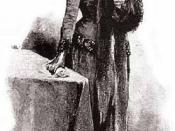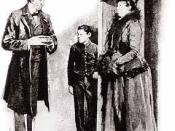"A Case of Identity" by Sir Arthur Conan Doyle and Twin Peaks by David Lynch both involve a mystery and a main detective on the case. In "A Case of Identity" the main detective is Sherlock Holmes and in Twin Peaks the detective is Agent Cooper. Each detective has his own way of finding out "Who Dunnit?" and solving the mystery. I believe that Sherlock Holmes' way of using strictly deductive thinking makes "A Case of Identity" a better mystery than that of Twin Peaks.
The fact that Sherlock Holmes uses only deductive thinking and an overall logic-based thought process makes "A Case of Identity" a more believable and interesting story. When a story has non-fictional elements to it, it allows the reader to feel more as if they are involved with what is happening. Conversely, when a story is completely fictional, the reader can think 'this would never happen, it's impossible'.
The more non-fictional elements to a story, the better the reader can relate to the story. Holmes figures out the mystery of "what happened to Mr. Hosmer Angel?" by observing specific facts and using his clever brain. Sherlock even knew at the very beginning of the story that Miss Mary Sutherland was coming to ask for his help. He saw her standing outside on the pavement and noticed that the way she was acting were signs of a woman in need of advice. Holmes shows off his brilliance by saying, "Oscillation upon the pavement always means an affaire de coeur. She would like advice, but is not sure that the matter is not too delicate for communication" (Doyle 58). Holmes knew the premise of what Miss Mary Sutherland came to ask for help over and he even figured out what Miss Sutherland's profession was within the first...

